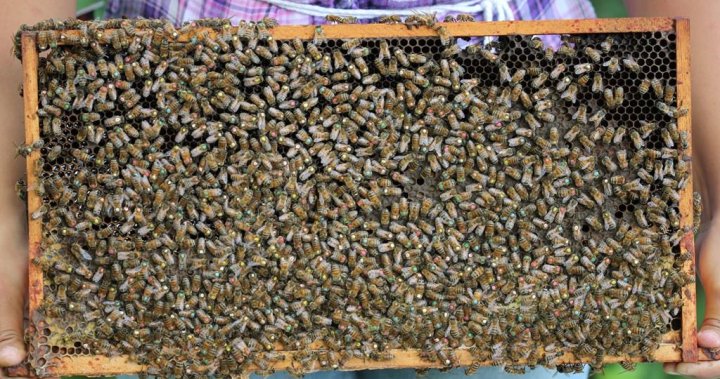Spring with its flowers and bees seems a distant thought as people are about to enter the depths of winter.
But while bees hibernate, pollination ecologist Gail McInnis is busier than ever. She has a word of warning for those whose new year’s resolution might be to join the community of urban beekepers.
“We could start seeing more decline in our wild bee species,” said McInnis, a former Concordia postdoctoral researcher.
McInnis led a study where she compared bee population data she collected during the pandemic with research conducted by Étienne Normandin 10 years ago.
Normandin, an entomologist at the Université de Montreal, also documented what kinds of bees and how many there were in Montreal in 2013.
In her research, McInnis found that the rapid growth in urban bee-keeping was negatively impacting nearby wild bee populations.
“It was negative, especially for small species, because the honey bee is very effective at collecting pollen nectars. So we see an exploitative competition,” Normandin said.
Get the latest National news.
Sent to your email, every day.
Turns out, the new honey bees were sucking nearby pollen dry, leaving smaller native species hungry and forcing them out of their environment.
Beehives have popped up on the roofs of institutions such as Quebec City’s iconic Château Frontenac and Pointe-Claire’s public library to name a few.
According to Quebec’s Agriculture Ministry the number of honey bee colonies on the island of Montreal has increased over twelvefold.
In 2013, there were under 250 colonies. That number exploded to almost 3,000 in 2020.
Researchers are urging authorities to implement a registry and eventually cap the number of beehives available in the city. Just like the city of Gatineau has done. It hired a third party that issues permits for those who wish to have a beehive.
The city of Montreal says it has taken steps to better protect native pollinators. Its 2022-2027 protection plan includes regulations for the use and sale of pesticides.
Officials also pointed out that they finance an organization that collects beehives and informs the population about the insects and best practices in beekeeping.
However, the city says that the responsibility of registering beehives belongs to Quebec’s ministry of agriculture and that it does not intend on putting a registry in place.
“The honey bees are domesticated pollinators. It’s like the chicken of the bee world, so keeping chickens or keeping honey bees on your rooftop is doing nothing to save all the other bee species or bird species,” McInnis said.
McInnis advises those who want to help the bees to plant more native flowers and long-blooming plants.
An action that will reap sweeter rewards.
© 2023 Global News, a division of Corus Entertainment Inc.




